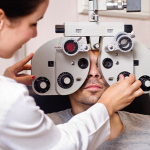Dr. Zuhal Butuner: Protect the Eyes the Natural Way
Ophthalmologists and optometrists are crucial in detecting eye diseases such as cataracts, retinopathy, and glaucoma. These eye conditions, notes Dr. Zuhal Butuner, can be detected during annual dilated eye examinations.
There are several essential points that people have to remember to protect their eyes.
First, if the patient has diabetes, they are encouraged to get regular comprehensive eye exams. This exam includes a dilated retinal exam which evaluates the health of the retina for diabetic changes. Early on, diabetic retinopathic changes may not have obvious visual symptoms. That’s why it is important for an eye doctor to evaluate the eye routinely. That said, people should watch for any changes in their vision and visit their eye doctor immediately if they notice changes in their vision. Finally, people can reduce their chances of visual impairment by controlling their blood sugar level and overall good health.
As an added detail, it’s also helpful to share information, such as the one found in CDC’s fact sheet — Take Charge of Your Diabetes: Healthy Eyes.
On that note, Dr. Zuhal Butuner talks about the natural methods people can practice caring for their eyes.

A healthy diet is almost a sure way to help maintain eye health and get the nutrients the eyes need. That is why it’s to know what to put in your body.
Let’s talk about essential vitamins for the eye. Vitamin A comes from sweet potatoes, carrots, and cantaloupes. Vitamin C you can get from oranges, tomatoes, and omega-3 fatty acids, which can be found in tuna and salmon, chia seeds, and halibut. Other essential nutrients, such as lutein and zeaxanthin, are minerals in spinach, kale, spinach, and eggs. Lastly, zinc, lima beans, and oysters are in the kidney.
Dr. Zuhal Butuner notes that zinc can reduce copper levels in the body. Copper is important for your body’s red blood cell production. Talk to your doctor and ask about safe ways to increase your zinc intake without lowering your copper quantities to dangerously low levels.
All these nutrients are a significant part of how the body keeps the eyes healthy.
Blood Flow and Oxygen
The eye is an organ and a complex one at that. It has arteries and fluid that deliver nutrients and oxygen to all parts, including the cornea, crystalline lens, and retina. A healthy blood flow means the eye can maintain itself better. However, poor blood flow can limit the delivery of key nutrients that blood is designed to carry, which can be bad for the eyes.
Supplements
The routine use of supplements on eye health is up for debate. Many of the top brands make broad claims about helping your vision health, and to make matters worse, these claims are not supported by science, Dr. Zuhal Butuner says.
One notable exception, however, is the AREDS2 formula, which is research-backed and designed to help slow down the progression of certain levels/grades of age-related macular degeneration (AMD) (e.g., Reduces the risk of advanced dry AMD to wet AMD progression). AMD is an eye health condition that happens as one ages. In this condition, certain elements in and of the eye break down.
It is worth discussing AREDS2 use with your eye doctor before beginning the formula. Your doctor will tell you if your eye will benefit from the use of eye supplements.
Actions and Behaviors
Apart from maintaining a healthy diet, some behaviors may be able to positively affect your eyesight, explains Dr. Zuhal Butuner.
As mentioned earlier, getting regular comprehensive medical eye exams is a wise idea. Researching your family’s medical history will help you know and understand your risk factors. Maintaining the ideal weight is also a big deal because it reduces your risk of having conditions affecting your eye and overall health. Avoiding smoking altogether reduces the risk of developing many eye diseases, such as cataracts, glaucoma, and AMD. Reducing sugar intake for non-diabetics and diabetics is also an important risk-reduction measure.
Wearing sunglasses when going outside to protect your eyes against the sun’s UV rays is also highly recommended because UV is a known risk factor for developing AMD. Practicing good hygiene, such as washing your hands and taking care of your contact lenses, can go a long way. Finally, always practice good eye safety, especially in industrial settings and playing racquet sports.
Read more on Dr. Zuhal Butuner‘s insights on the health and wellness of the eyes by clicking on this link.






